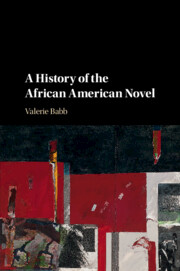Book contents
- Frontmatter
- Dedication
- Epigraph
- Contents
- List of Illustrations
- Acknowledgments
- PART I HISTORY
- Introduction: The Problem with the Title of this Volume
- 1 Out of Many One: The Beginnings of a Novelistic Tradition, 1850s– 1900s
- 2 Publish or Perish: African American Novels, 1900s– 1920s
- 3 Aesthetics of Race and Culture: African American Novels, 1920s– 1940s
- 4 Home of the Brave: African American Novels, 1940s– 1960s
- 5 Black Arts and Beyond: African American Novels, 1960s– 1970s
- 6 From Margin to Center: African American Novels, 1970s– 1990s
- 7 “Bohemian Cult Nats”: African American Novels, 1990s and Beyond
- PART II SIGNIFICANT GENRES OF THE AFRICAN AMERICAN NOVEL
- Coda
- Appendix
- Notes
- Works Cited
- Index
7 - “Bohemian Cult Nats”: African American Novels, 1990s and Beyond
from PART I - HISTORY
Published online by Cambridge University Press: 28 July 2017
- Frontmatter
- Dedication
- Epigraph
- Contents
- List of Illustrations
- Acknowledgments
- PART I HISTORY
- Introduction: The Problem with the Title of this Volume
- 1 Out of Many One: The Beginnings of a Novelistic Tradition, 1850s– 1900s
- 2 Publish or Perish: African American Novels, 1900s– 1920s
- 3 Aesthetics of Race and Culture: African American Novels, 1920s– 1940s
- 4 Home of the Brave: African American Novels, 1940s– 1960s
- 5 Black Arts and Beyond: African American Novels, 1960s– 1970s
- 6 From Margin to Center: African American Novels, 1970s– 1990s
- 7 “Bohemian Cult Nats”: African American Novels, 1990s and Beyond
- PART II SIGNIFICANT GENRES OF THE AFRICAN AMERICAN NOVEL
- Coda
- Appendix
- Notes
- Works Cited
- Index
Summary
Freestyle, a 2001 Studio Museum in Harlem exhibition of twenty-eight emerging black visual artists, gave currency to the term post-black. In the catalogue accompanying the exhibit, curator Thelma Golden described post-black art as a genre whose artists wanted to resist the label “black artist,” not because they wished to shun their racial identification but because they felt this term too laden with past racial histories and too aesthetically constricting (14). The exhibit emphasized the ways this group of creators felt free to draw upon any artistic tradition they chose, from modernism to hip-hop. A few years later, with the 2008 election of Barack Obama, a self-identified black president, media outlets such as National Public Radio, huffingtonpost.com, and The New Republic, as well as academic conferences all queried if the United States had entered a post-racial moment when racial identity was no longer central to the ways Americans defined themselves. These queries were in marked contrast, however, to studies such as the National Urban League's 2009 and 2010 State of Black America reports, which outlined continued racial inequalities in the criminal justice system, education, employment, access to health care, and housing. The contested terms post-racial and post-black indicate that the position of blackness in the United States has changed and has not changed. African American novels today are part of this ongoing conversation. Writers of the late twentieth and early twenty-first centuries continue to engage the significances of being “raced” as black in the United States, but their works express blackness less as a fixed entity and more as a continually self-evaluating process.
Greg Tate characterizes this generation of authors as part of the “bohemian cult-nats,” a group conversing about essentialism, post-blackness, and hybridity. They are in his view,
mutating black culture, … cross-breeding aesthetic references … And while they may be marginal to the black experience as it's been expressed in rap, Jet, and on The Cosby Show, they're not all mixed up over who they are and where they come from.
- Type
- Chapter
- Information
- A History of the African American Novel , pp. 189 - 212Publisher: Cambridge University PressPrint publication year: 2017



